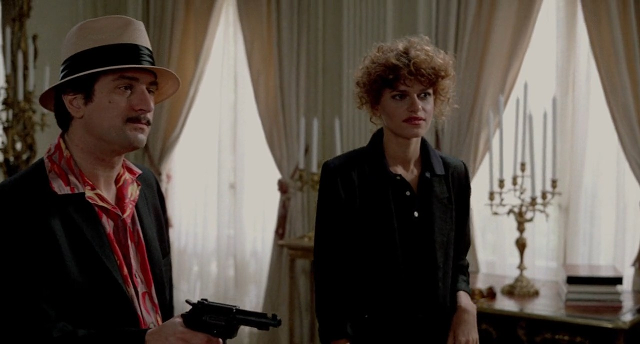Wednesday, April 29, 2020
The King of Comedy (1982)
The film opens with an insane crowd flocking around a Jerry Lewis-like character (played by Jerry Lewis). It’s intentionally nauseating. The movie knows more than the audience at this point, presenting an alien world of televised comedy and the surrounding fandom. This is Scorsese’s world, a world of extreme characters in the American excess of the last century.
Scorsese presents a century unburdened by soulless tech giants, fraud, deception, and insincerity. A century in which you can either talk to Jerry Lewis’s secretary over the telephone or go in person. A wonderful century. The century presented is one in which the protagonist, an aspiring comedian played by Robert De Niro, is free to approach the business however he wants, and he carves his path right through the man who he thinks is his friend.

I don’t care about celebrity. I care about personability, real flesh-and-blood presence. I like to grab people in my hands and know that they’re standing right there in front of me, affirming my own existence. A stage doesn’t give you that, but to Robert De Niro’s character, the stage is everything. His performance among civilians is Hollywood, fluffy and cute with no substance. Jerry is not just his opportunity, Jerry is the end of his trajectory, his ideal in life.
The hero of this story is not just an obsessed fan, he is an ego vampire. We all know that Robert De Niro is a good actor, and film buffs know that he is a frequent collaborator with Scorsese. If Scorsese puts De Niro in a movie, the character usually comes out great.
De Niro’s captivating accomplice (played by Sandra Bernhard) is my kind of crazy. Unfortunately, Bernhard is better known for her comedy and her beauty than for her acting. Her performance in this film is spot-on, much like Jack Nicholson’s performance in The Shining (1980). Her character starts as mildly annoying and evolves to something intense and masterful. Her character exemplifies the proper way to stalk a celebrity.
De Niro’s character does it all wrong. He just wants to be famous. He doesn’t love Jerry Lewis, he just thinks they’re pals. Maybe they are, maybe they aren’t, it depends on your perspective. The problem is that he wants to replace Jerry, and he all but tells Jerry that. He adds stress to Jerry’s life, eating at the comedian like a parasite. His motivations could not be more different from Bernhard’s.
The film has its flaws. It drags a bit in the beginning, a symptom of the “first reel” thing from an era in which audiences were expected to show up late. Some of the shots are a bit underexposed, a symptom of shooting analog with faulty metering. It’s not as slick as Goodfellas (1990) but the characters in this film feel present.
This may all sound like a soap opera, but it’s a Scorsese movie. While Sandra Bernhard movies are in tragically short supply, Scorsese/De Niro movies are common and (Shark Tale excluded) damn good. If you like watching movies for the characters, you are in for a treat.